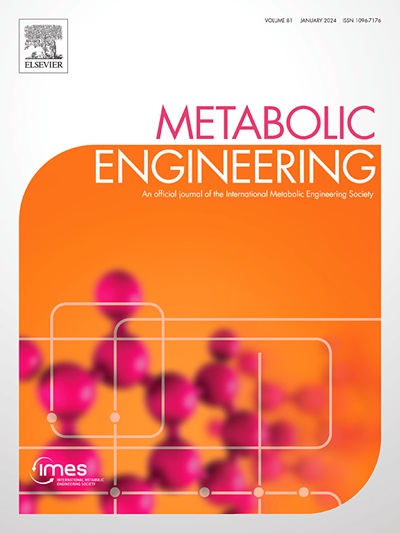Biosynthesis of 12-aminododecanoic acid from biomass sugars
IF 6.8
1区 生物学
Q1 BIOTECHNOLOGY & APPLIED MICROBIOLOGY
引用次数: 0
Abstract
Biosynthesis of 12-aminododecanoic acid (ADDA) directly from biomass-derived sugars would enable a more sustainable process for manufacturing the engineering polymer Nylon 12. ADDA biosynthesis is currently hindered by the cytotoxicity of dodecanoic acid (DDA) to growing cells, and the accumulation of the overoxidized byproduct dodecanedioic acid (DDDA). In this study, these challenges were addressed by engineering an autoinducible system to better control in vivo DDA synthesis without impacting growth, and deleting aldehyde dehydrogenases and oxidases to reduce DDDA accumulation. As a result, a one-step fermentation process was established to synthesize ADDA from glucose and cellobiose. Finally, batch fermentation achieved 1035 mg/L ADDA and 5% yield, which is the highest titer and yield accomplished directly from sugar to date. This research contributes to the mechanistic understanding of microbial DDA, ADDA, and DDDA synthesis, as well as the goal of developing more sustainable processes for nylon production.
生物质糖生物合成12-氨基十二烷酸。
直接从生物质衍生的糖中生物合成12-氨基十二烷酸(ADDA)将使制造工程聚合物尼龙12的过程更加可持续。目前,由于十二烷酸(DDA)对生长细胞的细胞毒性以及过度氧化的副产物十二烷二酸(DDDA)的积累,阻碍了ADDA的生物合成。在本研究中,通过设计一个自诱导系统来更好地控制体内DDA的合成而不影响生长,并删除醛脱氢酶和氧化酶来减少DDDA的积累,从而解决了这些挑战。为此,建立了以葡萄糖和纤维素二糖为原料一步发酵合成ADDA的工艺。最后,分批发酵获得了1035 mg/L的ADDA和5%的产率,这是迄今为止直接从糖中获得的最高滴度和产率。这项研究有助于了解微生物DDA, ADDA和DDDA合成的机理,以及开发更可持续的尼龙生产工艺的目标。
本文章由计算机程序翻译,如有差异,请以英文原文为准。
求助全文
约1分钟内获得全文
求助全文
来源期刊

Metabolic engineering
工程技术-生物工程与应用微生物
CiteScore
15.60
自引率
6.00%
发文量
140
审稿时长
44 days
期刊介绍:
Metabolic Engineering (MBE) is a journal that focuses on publishing original research papers on the directed modulation of metabolic pathways for metabolite overproduction or the enhancement of cellular properties. It welcomes papers that describe the engineering of native pathways and the synthesis of heterologous pathways to convert microorganisms into microbial cell factories. The journal covers experimental, computational, and modeling approaches for understanding metabolic pathways and manipulating them through genetic, media, or environmental means. Effective exploration of metabolic pathways necessitates the use of molecular biology and biochemistry methods, as well as engineering techniques for modeling and data analysis. MBE serves as a platform for interdisciplinary research in fields such as biochemistry, molecular biology, applied microbiology, cellular physiology, cellular nutrition in health and disease, and biochemical engineering. The journal publishes various types of papers, including original research papers and review papers. It is indexed and abstracted in databases such as Scopus, Embase, EMBiology, Current Contents - Life Sciences and Clinical Medicine, Science Citation Index, PubMed/Medline, CAS and Biotechnology Citation Index.
 求助内容:
求助内容: 应助结果提醒方式:
应助结果提醒方式:


